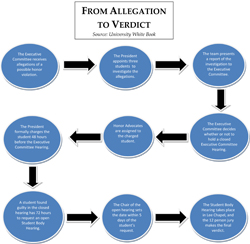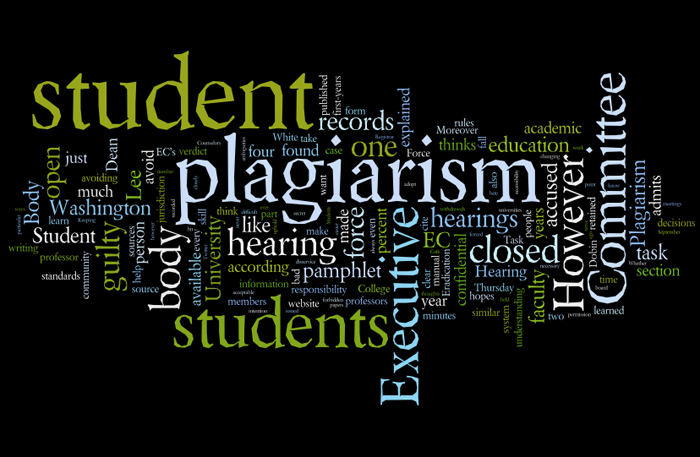Plagiarism accounts for nearly two-thirds of guilty verdicts for honor violations at Washington and Lee in the past two years, according to junior Executive Committee representative, Austin Branstetter.
Branstetter was one of four EC members appointed to the “Plagiarism Eradication Task Force” last September. The goal of the task force is to educate the student body about what is considered plagiarism and how to avoid plagiarizing.
Branstetter explained that because so much of what the EC does is confidential, he enjoys working on initiatives that are visible to the student body.
“There’s no uniform teaching of plagiarism at Washington and Lee, said Branstetter. “We want to make sure people aren’t ignorant on the rule.”
All W&L students pledge to abide by the honor system, which is based on the principle of trust, and demands that all students act honorably.
In addition to Branstetter, EC members Bill Larson, Jackie Smith, and Trevor Hatcher have worked closely with Dean of the College Hank Dobin to draft a plagiarism pamphlet that will serve as a supplement to the University White Book. Dobin published a similar manual when he was Associate Dean of the College at Princeton University. Branstetter has been the primary author of the student section, whereas Dobin is writing the section addressed to the W&L faculty.
Additionally, the task force hopes to get permission from Dean of First-Year Students Dave Leonard to meet with first-years early next fall. Branstetter said that the details aren’t finalized, but the task force is planning “Plagiarism Week.” During that week, the plagiarism pamphlet will be available to all students, and activities like open discussions between first-years, resident advisors and peer counselors will be organized.
Dobin said that plagiarism education is necessary because, “In high school, students are never really held to any sort of standard.”
The name, “Plagiarism Eradication Task Force” is a bit optimistic, said Dobin. “I’d be content with plagiarism reduction, or minimization,” he said. However, Dobin does think that the task force and pamphlet are imperative. The pamphlet will have similar features of Dobin’s academic integrity manual that he published in 2005.
Dobin hopes that this additional document will help students avoid difficult situations. He explained that there can always be cracks where the rules of plagiarism may not be as clear, especially when students share thoughts and ideas about a particular assignment. He said the plagiarism statistic doesn't surprise him.
"Plagiarism is a large, gray area of misunderstanding, and the rules are much less clear,” Dobin said.
Dobin said there are two ways to avoid plagiarism. “If you are unsure, cite a source, and play it safe, or secondly, just ask the professor,” he said.
Not only the task force, but also the University Library has been improving the accessibility of plagiarism guidelines. Years ago, Senior Reference Librarian Dick Grefe, Dobin, and several faculty members began a “Plagiarism Investigation Committee” with the intention of creating a website that complied citation styles and included a section about avoiding plagiarism.
Grefe said, “Most W&L students want to give credit, but the question is how?”
With the rise of blogs, online sources, and social media, like Facebook and Twitter, it has become “acceptable” not to cite, according to Grefe.
Dobin agrees. “The Internet has made all of us sloppy about our information. There are all sorts of questions about ownership…it has made citing harder, not easier,” Dobin said.
Whether it’s quoting or paraphrasing, “It’s not an instinctive skill. It’s a learned skill,” Grefe said.
Proper citations must be learned because “even excellent students adopt bad habits,” Dobin said.
During Grefe’s 31 years at W&L, professors have contacted him when they can’t find a source that a student cited. However, most professors notice when a student has blatantly plagiarized because work is distinctive at our small university and more apparent, Grefe said. Dobin agreed that at W&L, the faculty knows students better than teachers at larger universities would, making them more sensitive to plagiarism.
Even so, the burden falls upon the student when it comes to avoiding plagiarism, and “part of education is asking,” Grefe said.
Not all students struggle with plagiarism. Grefe explained that most of the time students over-credit their sources because they have little experience writing research papers. Grefe is confident that there is not a plagiarism problem at W&L, even though it can “feel” like the pledge has lost its touch. |
View Twitter chat about online plagiarism
What the W&L Library says about plagiarism
Navigate the Executive Committee's website
Review the Plagiarism Handbook that Dean Dobin published at Princeton University
View a draft of the Plagiarism Pamphlet

|

![]()





